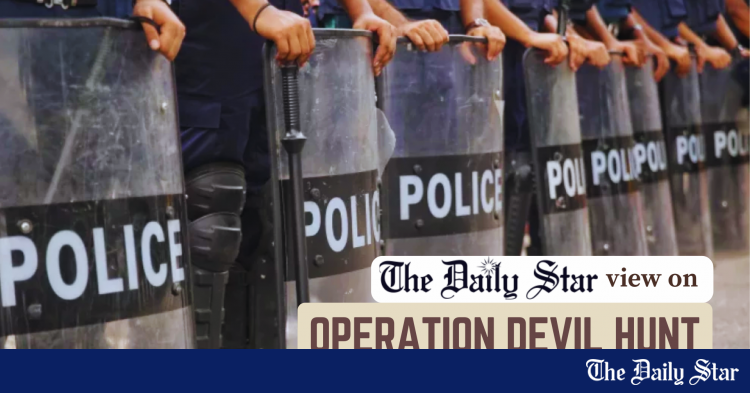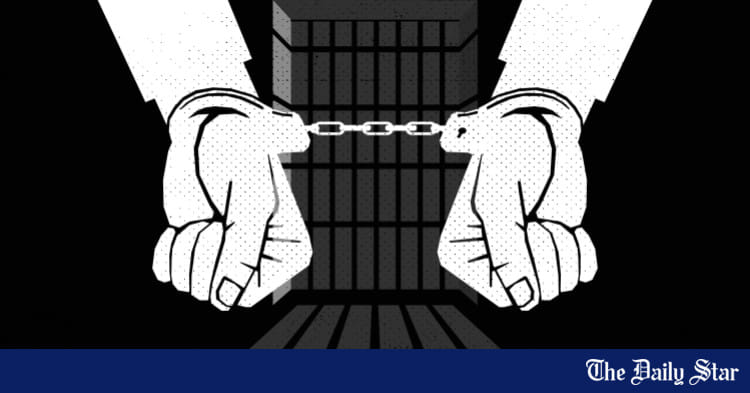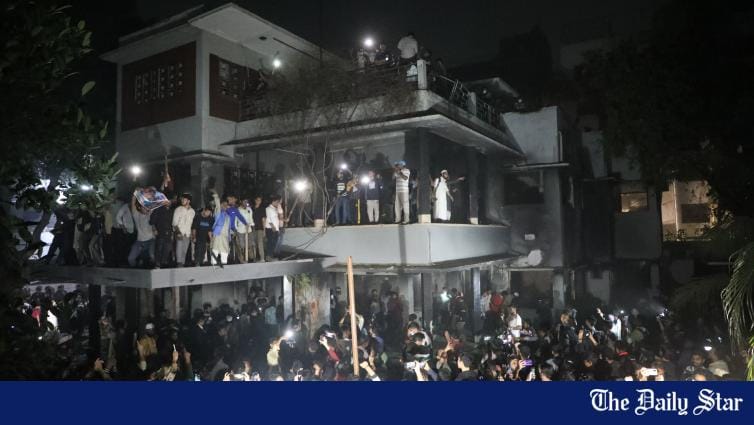Operation Devil Hunt launched to curb crimes
Staff Correspondent 09 February, 2025, 00:40

The government on Saturday launched ‘Operation devil hunt’ to be conducted by the joint forces across the country in a bid to restore deteriorating law and order, bringing the perpetrators of violent crimes to justice.
The decision came at a law and order meeting convened at the home ministry at Bangladesh Secretariat in the wake of a violent attack on students and people in Gazipur on Friday night, said a home ministry press release issued on Saturday.
‘Several people were injured in an attack by ousted fascist criminals in Gazipur on Friday night,’ the release read.
The release also mentioned that details of the drive would be given through a press conference on Sunday.
At least 15 students were injured in a counterattack on Friday night by local people as several dozens of students reportedly went to attack the residence of AKM Mozammel Haque, the former liberation war affairs minister of the ousted Awami League regime.
The incident took place at about 10:00pm when people, including members of Student Movement Against Discrimination, attempted an attack on Mozammel Haque’s house in Gazipur city, according to the police and witnesses.
Following the incident, Gazipur Sadar police officer-in-charge Md Arifur Rahman has been withdrawn as he faced allegations of reaching the spot two hours later.
A spate of attacks was carried out on the house of Awami League leaders, party offices, and murals and portraits of the country’s founding president Sheikh Mujibur Rahman and his daughter deposed prime minister Sheikh Hasina since Wednesday evening when the Bangabandhu Memorial Museum building at Dhanmondi 32 in Dhaka city was razed to the ground.
The chaotic situation began when different groups on their social media platforms called on people to join the ‘Bulldozer procession’ to demolish the Dhanmondi 32 building as Sheikh Hasina, now sheltered in India, was scheduled to address the country’s student community online on Wednesday late evening.
Earlier on September 4, the joint forces began another drive across the country to recover illegal firearms.
According to the home ministry, 5,818 firearms belonging to the law enforcement forces were looted during the July-August student-mass uprising and in the aftermath of the fall of Sheikh Hasina regime on August 5.
Police headquarters officials said that they had lost 5,750 various types of firearms to the looters and recovered 4,358 of them till January 16 through joint drives.
The interim government led by Professor Muhamamd Yunus, which took over the office on August 8, has yet to streamline the law and order situation.
In the past six months since its takeover, robberies, political violence, murders, mob violence, extortions and other crimes have soared, while criticisms are leveled at law enforcement personnel that they are giving the cold shoulder to the victims and often remain indifferent to the rise of violent crimes.
The PHQ data shows that 628 robbery incidents were reported between August and December in 2024 with 159 in December alone against 496 during the timeframe in 2023.
A total of 1,565 murder cases were filed between August and December in 2024 against 1,199 cases during the timeframe in 2023, the data shows.
It also shows that at least 326 kidnapping cases were filed from August to December in 2024 with 74 in December alone against 229 kidnapping cases were filed in the last five months in 2023.
Frequent mugging incidents also becomes a concern in Dhaka city as seven cases were reported in August, 17 in September, 33 in October, 38 in November and 51 in December, according to Dhaka Metropolitan Police officials.
Staff Correspondent 09 February, 2025, 00:40
The government on Saturday launched ‘Operation devil hunt’ to be conducted by the joint forces across the country in a bid to restore deteriorating law and order, bringing the perpetrators of violent crimes to justice.
The decision came at a law and order meeting convened at the home ministry at Bangladesh Secretariat in the wake of a violent attack on students and people in Gazipur on Friday night, said a home ministry press release issued on Saturday.
‘Several people were injured in an attack by ousted fascist criminals in Gazipur on Friday night,’ the release read.
The release also mentioned that details of the drive would be given through a press conference on Sunday.
At least 15 students were injured in a counterattack on Friday night by local people as several dozens of students reportedly went to attack the residence of AKM Mozammel Haque, the former liberation war affairs minister of the ousted Awami League regime.
The incident took place at about 10:00pm when people, including members of Student Movement Against Discrimination, attempted an attack on Mozammel Haque’s house in Gazipur city, according to the police and witnesses.
Following the incident, Gazipur Sadar police officer-in-charge Md Arifur Rahman has been withdrawn as he faced allegations of reaching the spot two hours later.
A spate of attacks was carried out on the house of Awami League leaders, party offices, and murals and portraits of the country’s founding president Sheikh Mujibur Rahman and his daughter deposed prime minister Sheikh Hasina since Wednesday evening when the Bangabandhu Memorial Museum building at Dhanmondi 32 in Dhaka city was razed to the ground.
The chaotic situation began when different groups on their social media platforms called on people to join the ‘Bulldozer procession’ to demolish the Dhanmondi 32 building as Sheikh Hasina, now sheltered in India, was scheduled to address the country’s student community online on Wednesday late evening.
Earlier on September 4, the joint forces began another drive across the country to recover illegal firearms.
According to the home ministry, 5,818 firearms belonging to the law enforcement forces were looted during the July-August student-mass uprising and in the aftermath of the fall of Sheikh Hasina regime on August 5.
Police headquarters officials said that they had lost 5,750 various types of firearms to the looters and recovered 4,358 of them till January 16 through joint drives.
The interim government led by Professor Muhamamd Yunus, which took over the office on August 8, has yet to streamline the law and order situation.
In the past six months since its takeover, robberies, political violence, murders, mob violence, extortions and other crimes have soared, while criticisms are leveled at law enforcement personnel that they are giving the cold shoulder to the victims and often remain indifferent to the rise of violent crimes.
The PHQ data shows that 628 robbery incidents were reported between August and December in 2024 with 159 in December alone against 496 during the timeframe in 2023.
A total of 1,565 murder cases were filed between August and December in 2024 against 1,199 cases during the timeframe in 2023, the data shows.
It also shows that at least 326 kidnapping cases were filed from August to December in 2024 with 74 in December alone against 229 kidnapping cases were filed in the last five months in 2023.
Frequent mugging incidents also becomes a concern in Dhaka city as seven cases were reported in August, 17 in September, 33 in October, 38 in November and 51 in December, according to Dhaka Metropolitan Police officials.















